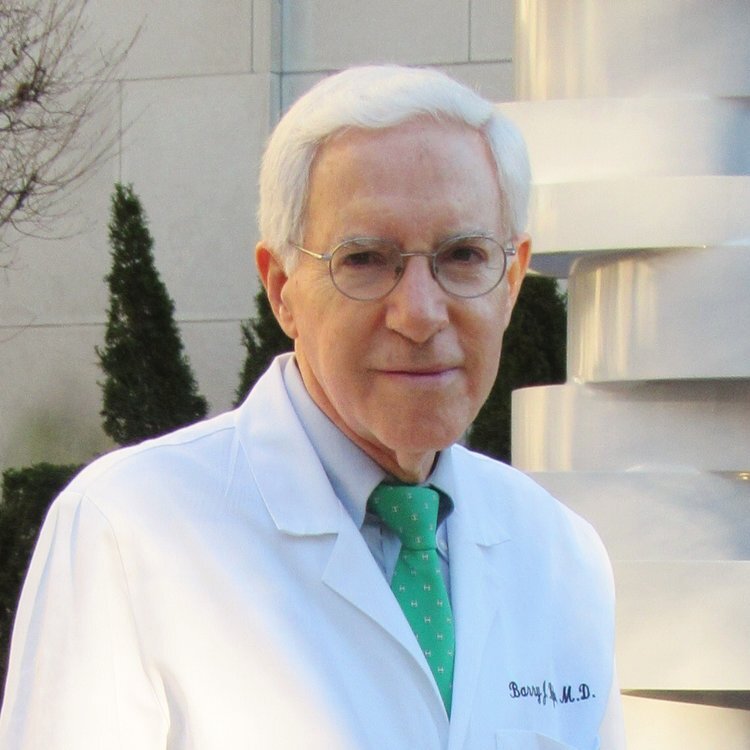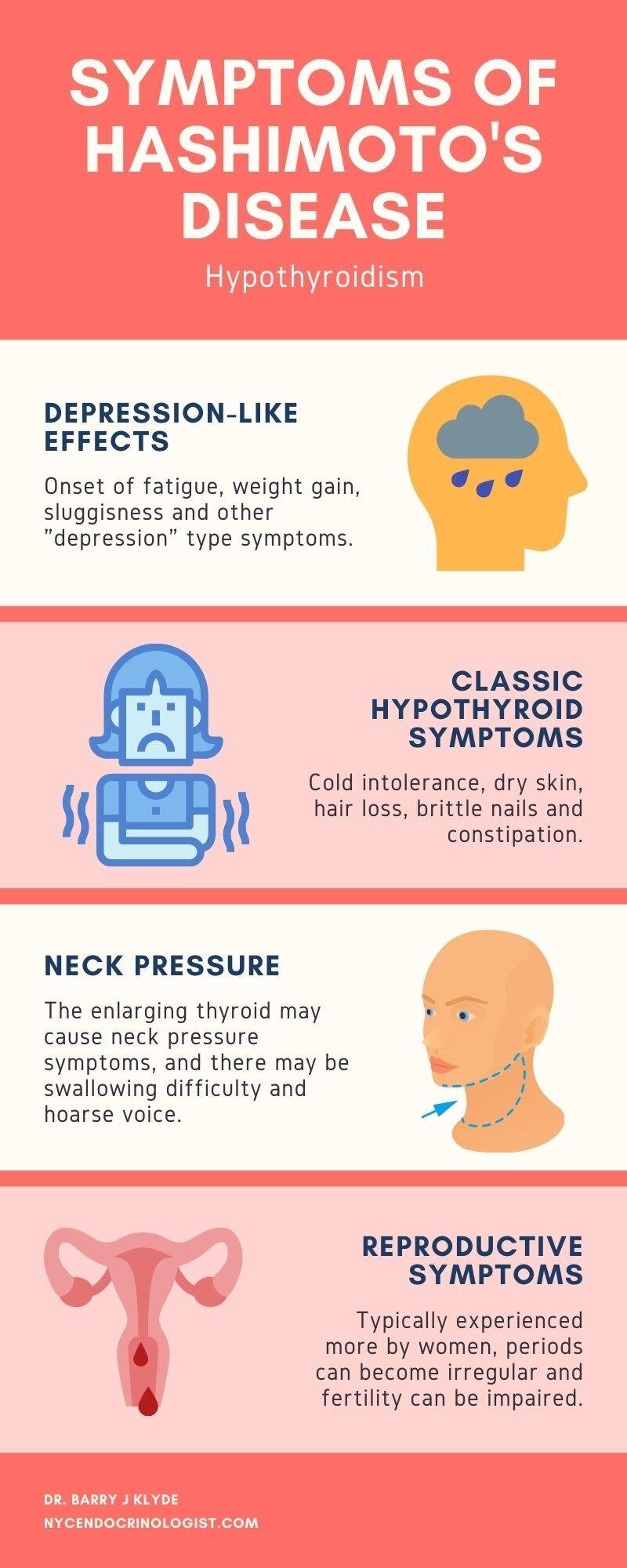Hashimoto’s Specialist NYC
One of Dr. Klyde’s specialties is Hashimoto’s Disease, which is the most common thyroid disorder. He works with patients all over the NYC and Tri-State area in helping them manage this condition. If you’re looking for a board-certified, caring, and awarded doctor, please give us a call today to book an appointment.
Hashimoto's Disease - Thyroid Disorder
OVERVIEW
Hashimoto's disease is the most common thyroid disorder, affecting up to 15 % of women and one quarter as many men. Onset is usually in the 30s and 40s, but may begin as early as infancy or in advanced old age. It is an autoimmune condition in which lymphocytes (one of several different types of white blood cells) mistakenly attack normal thyroid tissue, hence the designation chronic lymphocytic thyroiditis. The chronic inflammation causes enlargement of the thyroid, and eventually impairs thyroid function. The decreased thyroid function, or hypothyroidism, may progress so slowly that it is not recognized initially. Some people may be more sensitive and feel symptoms early in the illness.
Symptoms
Typical hypothyroid symptoms include fatigue, weight gain, cold intolerance, dry skin, hair loss, brittle nails and constipation. The enlarging thyroid may cause neck pressure symptoms, and there may be swallowing difficulty and hoarse voice. There are effects on reproductive function, more in women than in men. Periods may become more heavy, and may become less frequent or even stop entirely. Fertiltiy is impaired, in part because of interference with ovulation, but also because of an autoimmune effect. Women who have progressed to infrequent or absent periods are certainly less fertile, but even women who still have regular periods may have a harder time conceiving. The impaired fertility is seen even in women who have thyroid inflammation but have not yet become hypothyroid. Thyroid medication corrects hypothyroidism, but interestingly, in infertile women with Hashimotos disease who are not yet hypothyroid, treatment with thyroid medication will improve fertility.
Diagnosis
Diagnosis of Hashimotos disease is confirmed by finding hypothyroid lab results. The output of the thyroid, the hormones T4 and T3, is less. The body tries to push the failing thyroid by having the pituitary gland release more thyroid stimulating hormone, TSH. At first the elevated TSH can push the failing thyroid to increase its output of T4 and T3, but eventually even the elevated TSH does not correct thyroid output, and T4 and T3 drop while TSH goes higher and higher. Hashimotos disease may cause elevation of the anti-thyroid antibodies anti-TG and anti-TPO, but not always. In studies of large numbers of patients with Hashimoto’s disease diagnosed by finding lymphocytic inflammation in thyroid biopsy specimens or surgical specimens, doctors looked back to see what their antibody studies showed before the procedure. 20 to 50% had negative antibody levels, although tissue samples later showed Hashimoto’s disease. This means that antibody studies can indicate the diagnosis but are not able to eliminate the possibility if negative. Hypothyroidism is caused by Hashimoto’s disease, unless it results from a destructive process such as surgery for cancer or radiation therapy.
Treatment
Treatment is with thyroid hormone. The most commonly used medication is Synthroid, which contains T4. The thyroid makes both T4, an inactive precursor, and smaller amounts of T3, the active thyroid hormone. T4 is converted to T3 in other parts of the body, even in people who have had the thyroid removed. For most people, Synthroid, or T4, works fine, but a small number of people do not return to feeling well on just Synthroid. Perhaps this is because they do not convert T4 to T3 as well as others. They can be helped by adding Cytomel, or T3, to the Synthroid, or switching to an older preparation, Armour thyroid, which is an extract of pig thyroid and contains both T4 and T3.
COMPLICATIONS
Left untreated the hypothyroidism caused by Hashimoto’s disease can lead to a variety of health problems: Goiter: A goiter is an abnormal enlargement of the thyroid gland. It can cause pressure symptoms, including hoarse voice, difficulty swallowing and breathing, and cough. The goiter is caused both by chronic inflammation and TSH stimulation from the pituitary due to low thyroid production.
Mental Health Effects: Hashimoto’s can cause depression which does not respond to antidepressant medication but does improve with thyroid hormone. There can be brain fog with slowed thinking, difficulty with focus and concentration and impaired memory. Hashimoto’s has also been found to reduce sexual desire (libido) in both men and women. In some cases, Hashimoto’s flare ups can even present as bipolar disorder.
Birth defects and complications during pregnancy: During the first trimester, the fetus depends on the mother’s supply of thyroid hormone. Effects of a mother's underactive thyroid on a fetus may include preterm birth, low birth weight, birth defects, thyroid problems, mental development disabilities, and stillbirth.
Heart Problems: If left untreated for an extended period could cause congestive heart failure.
Myxedma: Myxedma can be a consequence of prolonged hypothyroidism, and can be a medical emergency. It can cause skin changes such as face swelling (face, lips, eyelids, and tongue) as well as swelling or thickening of skin anywhere in the body, particularly in the lower legs. The skin condition is caused by sugar molecules (complex mucopolysaccharides) in the skin, which attract water, leading to swelling. At the extreme, a myxedema crisis occurs when the body can no longer tolerate the severe hypothyroidism, so it decompensates. This is a life threatening state, and can cause: decreased breathing, low blood sodium, hypothermia, confusion, shock, low blood oxygen, high blood CO2, coma and seizures. Without a rapid diagnosis, myxedema crisis is often fatal. The mortality rate may be 25 to 60 percent.
Gender: Women are about 4 times more likely to have the disease. Hashimoto's thyroiditis sometimes begins during pregnancy.
Age: Hashimoto's disease can occur at any age but more commonly occurs during the 30s and 40s.
Heredity: Hashimoto’s disease is an inherited disorder. More than half of a patient's relatives have elevated antibodies, but only a portion of them go on to develop the disease. Some patients have no family history of the illness.
Other Autoimmune Disease: Hashimoto’s is the most frequent autoimmune illness and can be seen with other autoimmune diseases. These include B12 deficiency, gluten sensitivity, rheumatoid arthritis, type 1 diabetes, lupus, and adrenal insufficiency, or Addison’s disease. Excessive Iodine: Patients with Hashimoto’s disease may develop a goiter, or enlarged thyroid, if given iodine supplements.


